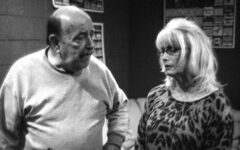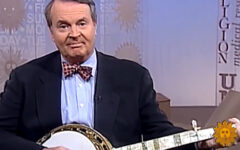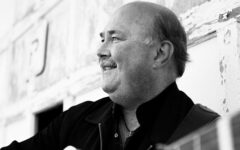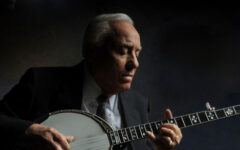
As previously reported, one-time Blue Grass Boy and life-long bluegrass musician and singer Vernon McQueen passed away on March 16, 2017. He was 86 years of age.
Vernon McQueen was born on August 6, 1930, in McKee, Jackson County, in Kentucky.
Periodically, from 1958 through to 1960, he traveled with Bill Monroe and the Blue Grass Boys filling in as the guitar player and tenor vocalist.
Later he played guitar in what has been described as “a secondary Jamboree house band,” the Stoney Lonesome Boys, at Bill Monroe’s country music park at Bean Blossom, in Brown County, Indiana. The band consisted of fellow Blue Grass Boy Roger Smith [playing fiddle], with Osby Smith [on mandolin], Neil Rosenberg [banjo] and Ann Rosenberg [bass].
In later life McQueen traveled extensively with the Evangelaires playing the bass guitar for them. He also toured with the Gospel Meltones playing the guitar and singing with them.
Also, he enjoyed jam sessions with his bluegrass musician friends including the Hedrick brothers.
McQueen was involved with two – at least – recording projects; George Brock, Ralph King & the Traveling Crusaders I Thought of Mother and Dad (REM LP 1013, released in 1966) and George Brock and the Traveling Crusaders Sing Darkened Way (Jewel LP 115, 1967). McQueen played bass on both.
David Hedrick, the banjo-playing younger brother (with Gary) remembers learning a considerable amount about bluegrass music, and life, from McQueen ….
“I first was introduced to Vernon as an 11-year-old beginner learning bluegrass banjo and bluegrass music. My older brother, Gary and I had become students of Roger Smith, an ex-Blue Grass Boy from North Carolina, who was living in Columbus, Indiana. Our father, Marvin, had become a friend of Roger’s as Roger had moved to central Indiana to become part of the house band at Bill Monroe’s Music Park in Bean Blossom, Indiana.
Vernon had moved from Kentucky to Connersville, Indiana, in the early to mid-1950s to find work in eastern Indiana. I assume that Roger and Vernon became acquainted through the common contact of Bill Monroe, but am not completely sure of that as fact. Clearly Vernon was an exceptional guitar player and singer, that Roger identified immediately. Roger was a shrewd evaluator of musical talent and always worked to surround himself with the best musicians that he could find. In my opinion, Vernon fit perfectly into that role as Roger was putting a house band together to play Sunday afternoon shows at Bean Blossom, acting as the warm up band for the major bluegrass and country music’s acts that Monroe was booking into Bean Blossom starting in the late 1950s.
Vernon was a true ‘Kentucky Gentelmen’ in every aspect as I got to know him for next 50 years. He was sincere, polite, a bit quiet or reserved, but a true musical voice when on stage. His steady rhythm was a ‘rock’ that Roger could build the music on and he was reliable because he loved the music.
As a young ‘just starting out’ banjo player, Vernon could not have been more kind and understanding to both Gary and me. Vernon had four daughters, so I always felt that Gary and I became his ‘sons’ with music as the tie that bound us together. I was fortunate to continue to have played music on and off with Vernon until as recently as three years ago. The Stoney Lonesome Band was playing monthly in Madison, Indiana, for almost three years. Vernon provided the rhythm guitar, lead singing voice and occasional tenor whenever the song required it. The group had an arrangement of I Hear a Sweet Voice Calling that was pure Monroe inspired. Vernon would take the high falsetto part, a la Bill Monroe and it would always move me emotionally to hear it.
I believe each person that is truly dedicated to ‘THE MUSIC’ loses a bit each time one of the quiet giants of this music passes. Our generation has lost another lesser known but none the less giant of bluegrass music.”
Historian Neil V. Rosenberg was a prominent figure in the Brown County area of Indiana during much of the 1960s and formed a friendship with Vernon McQueen during that time. Rosenberg’s forthcoming book, Blue Grass Generation: A Memoir, remembers some of the experiences of that era and those transformative years ……
“I first saw Vernon McQueen at the Brown County Jamboree in October 1962, when he played a brief set in an impromptu band led by Roger Smith on fiddle, and including Loren Rogers on banjo and Tom Ford on bass. It was fine straight-ahead bluegrass.
Vernon was a great bluegrass rhythm guitarist and lead singer. He knew all the classics in their original keys, and many more not so well known bluegrass and country songs. He played solid, driving rhythm guitar. I was impressed that he used thumb and finger picks on his right hand, like many of the pioneer bluegrass guitarists such as Flatt, Carter Stanley and Edd Mayfield.
Vernon was originally from McKee, Kentucky. He and Roger often played together. When I was working on the booklet for the 1989 Dayton Bluegrass Reunion, we found a photo of banjo star Noah Crase playing with Bill Monroe in 1958. Vernon and Roger were the other Blue Grass Boys in the picture from that show. Vernon’s older brother Herbert was an old friend of Bill Monroe; he often attended the Brown County Jamboree — generally with his tape recorder.
I got to know Vernon in August 1963 when we began playing music together. I was managing the Brown County Jamboree. Owner Monroe was playing that weekend. A second Opry star booked that day was a no-show. As Bill and I huddled backstage discussing our options, Vernon, Roger and Tom walked in. Bill asked Roger if they could fill in with a set. Roger said yes, turned to me, and said: ‘you play banjo.’ They quickly worked out a set list, and Roger taught me the baritone part for the trio they’d chosen.
By the end of the season in November Vernon and I had been working in the Jamboree house band every Sunday, and between him and Roger I learned a whole lot about playing and singing bluegrass. In 1965 we, along with Jim Bessire (bass) and Osby Smith (mandolin) formed the house band at Bean Blossom for the Brown County Music Corporation, and began calling ourselves the Stoney Lonesome Boys. From then until 1968 when I moved to Canada we played at a number of different venues. In 1994 we had a reunion at Bean Blossom. By then Vernon was playing with a flat pick — he told me he was able to play better rhythm with it.”
Gary Hedrick remembers McQueen’s patience and his willingness to help two bluegrass novices, regardless of the fact that the youngsters had a teacher already …..
“Vernon was a nice fellow…. devoted family man… deeply in love with his wife Phyllis.
One of the best (if not the best) straight bluegrass guitar players in this area. Understood the core bluegrass music very well.
Vernon was a patient person….. he had to deal with two young musicians thrust upon him at Bean Blossom. We were Roger Smith’s students and not really his burden to deal with. His rock-solid rhythm guitar playing was able to offer clues and cues to me. Sometimes I would get lost in a break and he would be there to catch me…. going around again…. playing a leading run that offered me a way back to the melody. I learned a lot during those years by watching him play.
As I got older and came back to bluegrass music in my 30s I developed an even greater respect for his talent and the way he executed his craft. Always that rock solid base to build on. Bad bass players…. cha, cha chops by a well-meaning mandolin player he played with…. all seemed to flow by him. He understood ‘Bill Monroe’ bluegrass.
Later in his life he re-discovered his religion and played a lot of Gospel music. He never pressed his newly re-discovered beliefs upon me.
He was always a D-18 person. Didn’t really like the D-28 boom.
He is missed.”
Mandolin player Roger Banister formed Buck’s Stove & Range Company while he was at Ball State University. For 15 years they travelled throughout the Midwest and overseas. Currently he plays with the Banister Family Bluegrass Band …..
“When I first met Vernon I was in awe of him because he played on the stage of the Bean Blossom barn at Bill Monroe’s park.
When I gained enough skill to play with Roger Smith and Vernon… he was very quiet.
He could play the rhythm guitar fast, clean and effortless when the song called for it. When I started playing with him he played with a thumb pick like Ed Mayfield but he could play equally well with a flat pick. Vernon could sing all four parts in a bluegrass band, but was gifted in lead, high lead and tenor.
For example, he was able to sing Bill Monroe’s high part in the Gospel quartet Get Down On Your Knees and Pray. An amazing vocal feat even in today’s high standards of bluegrass singing. As I grew older, Vernon and I really became good friends through bluegrass music. He had a quiet, sweet way about him and he was very encouraging to me especially when it came to me learning to sing bluegrass vocal parts.
He was always willing to stop during jam sessions and patiently help me learn a baritone part I was having difficulty with.
He was a true mentor to me not only in music but in life.
I will miss him but always remember him whenever I play music.”







